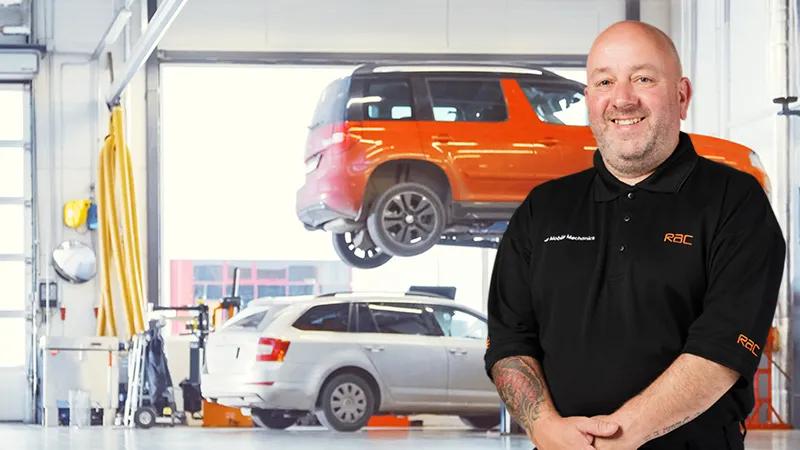
Book a wheel bearing repair
A faulty wheel bearing can lead to noise, uneven tyre wear, and even steering problems. To help make sure every drive is a smooth one, book your car in for a repair today.

Book a diagnostic
A mechanic will check your car for faults and talk you through any repairs you might need. There are various ways to check for faults, which could include a physical examination or plugging in to check your car’s onboard engine management system.
Content Guide
Introduction
If your car’s wheels are making strange noises, it could be time to inspect the wheel bearings. These important car parts help your wheels spin smoothly with less friction. Whether you’re new to driving or have years of experience, understanding wheel bearings is crucial. Regular maintenance and replacing them when needed can prevent bigger problems, keeping your vehicle safe and running well.
What’s a wheel bearing?
A wheel bearing connects the wheel to the axle with steel balls and a metal ring (called a race). They allow your wheels to spin smoothly with minimal friction. Due to heavy loads and constant use, they wear down over time. Regular inspections are crucial to detect issues early and maintain your car's safety and performance. Knowing when to replace them helps avoid breakdowns and costly repairs.
Wheel bearing replacement cost
Replacing wheel bearings can vary in cost due to these factors:
- Vehicle type: Larger or more complex vehicles may require more expensive bearings.
- Single or both sides: Sometimes only one wheel bearing needs replacing, but it's often recommended to replace both on the same axle for consistent performance.
- Labour costs: The amount of labour required can affect the overall cost, especially if accessing the wheel bearings is challenging.
- Part quality: Higher quality or OEM (Original Equipment Manufacturer) parts are pricier but offer better durability and performance.
It's wise to ask your mechanic for a thorough cost estimate since prices can differ among different garages.
Wheel bearing symptoms
Lookout for these signs that your wheel bearings need attention:
- Noise: You may hear a humming, rumbling, or growling sound that gets louder when you accelerate or turn.
- Vibration and wobble: Worn wheel bearings can cause your wheel to wobble or vibrate, especially at certain speeds or while steering.
- Uneven tyre wear: Damaged wheel bearings can lead to uneven tyre wear, noticeable during maintenance checks.
- Steering problems: If your steering feels less responsive or if you notice drifting, worn wheel bearings could be affecting your wheel's ability to turn smoothly.
Noticing these signs early can stop more damage and make your driving safer. If you do – see a mechanic soon.
How often should you replace your wheel bearing?
Wheel bearings wear out over time due to many factors. There isn't a set schedule for replacing them.
- Driving conditions: Rough roads, holes, or extreme weather can make wheel bearings wear out sooner.
- Vehicle usage: Driving a lot or using your vehicle a lot can also speed up wheel bearing wear.
- Quality: Good bearings last longer but can still fail if not put in right or looked after.
Check wheel bearings regularly and change them every 85,000 to 100,000 miles. Refer to your owner's manual for more details.
Why you should replace your wheel bearing
Changing a bad wheel bearing is important because of:
- Safety: Faulty bearings can affect how your vehicle handles and stops, even causing a wheel to come off.
- Car health: Bad bearings can harm other parts, costing a lot to fix.
- Savings: Replacing a bad bearing now can prevent expensive repairs later.
- Better driving: New bearings make your vehicle smoother, improving how it drives.
Maintaining wheel bearings is vital for safe driving. Check them often and replace them promptly to prevent bigger issues and keep your car dependable. Whether you're a novice or seasoned driver, understanding wheel bearings helps keep your vehicle running smoothly. If you notice any problems, visit a mechanic immediately.
Frequently asked questions on wheel bearing replacement
They wear out from rough roads, impacts, or not enough lubrication.
Look for odd noises, wheel vibrations, uneven tyre wear, or steering problems.
No, it's unsafe. They affect handling and can cause a wheel to come off.
Typically, 85,000 to 100,000 miles, depending on how and where you drive.
It depends on your warranty. Some cover it, others don't.
Usually not. Check your policy for specifics.
Prices vary by vehicle and work needed. Get an estimate from your mechanic.
Browse other top locations and makes across our network in the UK
Filter by


